Do you know what two words Hungarians say when they see a foreign bike courier?
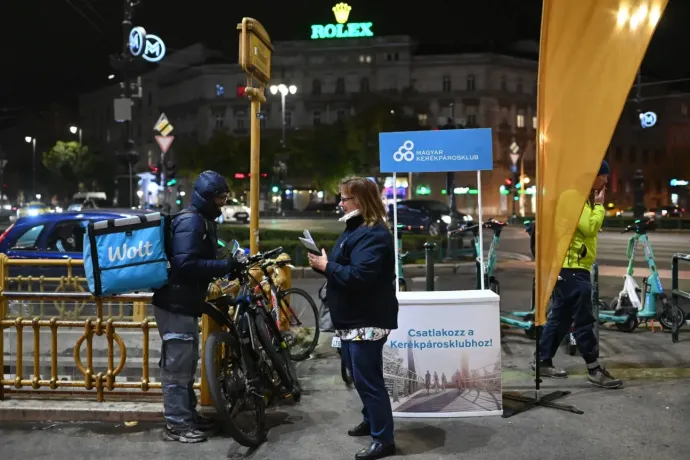
The Hungarian Cycling Association recently began distributing information booklets on Hungarian traffic regulations in Urdu and Vietnamese to couriers from those countries working in Budapest. They decided to do this after becoming aware of the growing tension between them and locals, since many of the couriers tend to ride on the sidewalk. The organization's goal is not to penalize them, but to reach out to them, and this has proven to be much more successful than they anticipated.
“Tell them to make sure they use their lights!”
one passerby said after finding out what the Cycling Association activists were doing at the organization's booth at Nyugati Square on a Tuesday evening. The activists were there to assist Pakistani and Vietnamese bicycle food couriers in adapting to Budapest traffic with the help of educational materials in Urdu and Vietnamese. Many residents of the capital have become all too familiar with the stereotype that bicycle couriers often speed on roads and at times on the sidewalk too without using any lights at all – and not everyone expresses their opinion on this in a very friendly manner.
"Do you know what are the two words Hungarians say when they see a foreign food courier? Fuck you!"
– Zaid told me in English when I asked him near the booth at Nyugati how he sees their situation in Budapest. Zaid came here from Dubai to make some extra cash for his studies in dentistry by working in food delivery for a while. Of course, they only swear at him when he's wearing his delivery bag, he noted. It doesn’t happen when he's not wearing it. Zaid works with an electric bike that also has a working light on it. When I asked him why couriers tend to speed on the sidewalk, his answer was: It's true that many do this, and it is a problem, but if you really look around, you'll see that everyone in Budapest is doing it too.
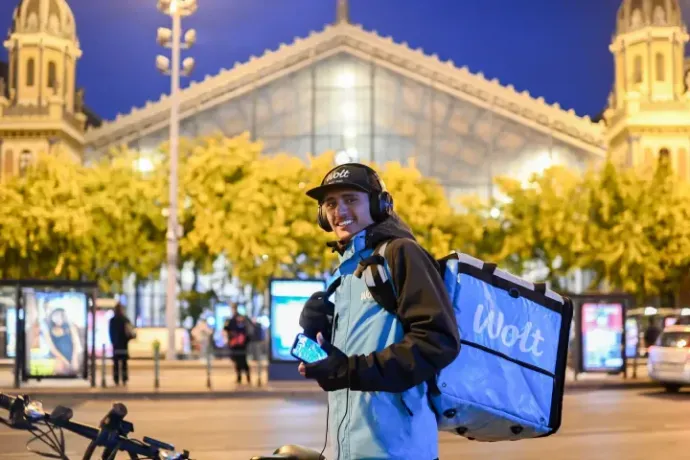
Meanwhile, Orsi Liptay, an activist from the Cycling Association and the initiator of the project spots another foreign courier in the square and starts running towards him with Urdu and Vietnamese flyers in hand. As she does, she shouts "No police! No accident!" to the visibly startled courier. Once she catches up with him, she explains what she wants to give him. The courier is visibly relieved and accepts the flyer with a smile.
I approached him too. It turned out that he had come to Budapest from Nepal and his goal was to get a degree at one of the business colleges. Like for Zaid, working as a courier is a source of additional income for him. When I told him that I once rode a scooter in the chaotic traffic of Kathmandu, he nodded with appreciation and added that hardly anyone cycles there. He told me that traffic in Budapest is also busy, and although it's not as chaotic as in Kathmandu, it's not easy for a foreigner to find their way around. Then he apologized for having to rush off and sped away.
How to cycle safely in Budapest?
When I walked back to Orsi Liptay, she told me that the Cycling Association had applied for funding with the local government of District VI this spring and had won 1.8 million forints for the project. They used the money to print flyers entitled: "How to cycle safely in Budapest?" in three languages (Urdu, Vietnamese, and Hungarian) and trained their activists in the best way to approach food delivery couriers in the street, keeping in mind that they are often distrustful, some do not speak English, and tend to be in a hurry.
"We are also sensing the growing tension around foreign food delivery couriers. They often ride on the sidewalk. But we don't want to punish them, we want to talk to them," Liptay said. She recalled that the idea came to her while she was reading the harsh comments about foreign food delivery couriers posted on the social media page of her district and saw that some people were glad whenever they heard that police had fined them during enforcement operations. But that is not going to educate them, as some of them do not even understand why they are being fined, she added.
After the first three outreaches, their experience is that the couriers’ response to the initiative is very enthusiastic. As Orsi Liptay recalled, the first time she approached a foreign courier, she faced great distrust, but now, as soon as they see the small booklet in Urdu or Vietnamese in her hand, their faces light up. Some read the whole thing on the spot, then photograph it and share it with their colleagues.
"When I found out that the Pakistani couriers kept sending screenshots of the booklet to each other because they lacked so much basic information, I cried," Orsi said. She estimates that they have been able to reach around 200 couriers in person so far, and by the end of the campaign, their eighth outreach, they expect this number to grow to around 500.
We were curious to find out what percentage of the foreign bicycle couriers working in Budapest this covers. According to Gergő Tóth (Greg), the co-chair of the Couriers' League, who is participating in the campaign as a volunteer, there are probably around 2,000-3,000 bicycle couriers in Budapest.
70-80 percent of those working in the inner districts are foreigners, while in the outer districts, the ratio is reversed. This is because of the high density of restaurants in the inner districts where it is easier to work with foreigners who are willing to work even 12 hours a day.
Most of the foreign couriers nowadays are Pakistani, but there are also Indians and Bangladeshis, and Gergő Tóth has even met one from Kyrgyzstan. There are also some from Vietnam, but their numbers have been declining sharply since the visa restrictions for them were tightened in January.
Why don't they use their lights?
According to Gergő Tóth, the foreign couriers working in Budapest come from completely different traffic cultures and often find it hard to understand why it is illegal to ride a bike on the sidewalk in Budapest. An Iranian courier colleague once told him that although he does have an international license, he is trying to learn the traffic regulations in the street while on the go, which is not always a good idea – given the traffic culture in the Hungarian capital.
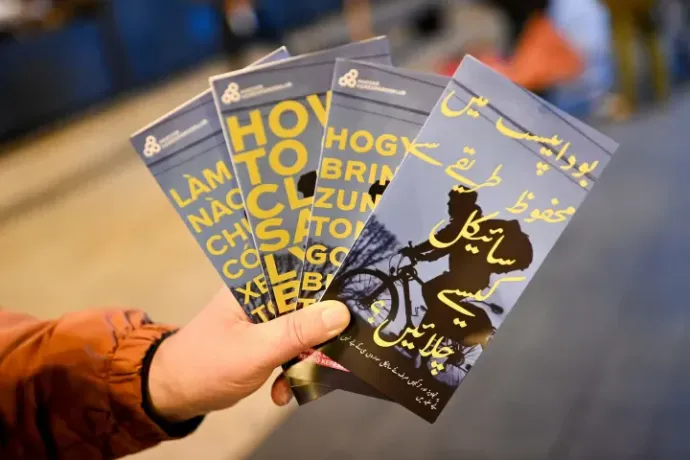
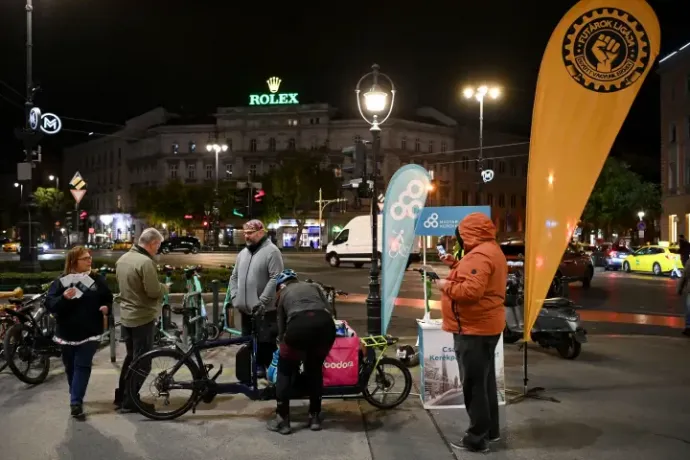
Things are further complicated by the fact that in Pakistan they drive on the left side of the road, as Salman, who arrived from the province of Punjab, pointed out when I asked him a few questions as he was getting a flyer. In his opinion, the volume of traffic and the basic traffic codes are otherwise similar in both countries.
However, using one's lights in the evening is not a basic rule for cyclists in the East. "Even I had an accident while cycling: I looked to the right, saw no one, set off, and was hit by a courier who was riding without their lights on," recalled Gergő Tóth. Fortunately, there were no serious injuries from the collision.
But why aren't they using their lights? I found the answer to this question with the help of János, who grew up in a mixed Hungarian – Arab family. As he said, the reason why couriers who are new to Hungary typically do not turn on the lights on their bike is mostly because where they come from, in Pakistan or the United Arab Emirates, the streets are lit up at night, so there is no need for using one's lights.
János also revealed the mysterious reason why many foreign couriers cover their faces with scarves: this is the common cycling attire during sandstorms in Arab cities. He admits that cycling on the sidewalk is not legal, but adds that couriers often have to park very close to the restaurant or the address they were sent to if they want to make sure that their bike doesn't get stolen – and to do so, they have to ride on the sidewalk for a bit.
The "I am a Hungarian courier" sticker
János used to work a lot as a courier, but now he mostly helps those arriving from the Pakistani region. As he said, there is a high turnover, with people constantly arriving from Arab countries, where they worked as couriers in the Emirates, Dubai or Kuwait, and when their six-month contract in Budapest expires, they move on to Portugal or England. There aren't many who stay here, given that they consider Hungary to be even worse than the Arab states, although Pakistani workers are not exactly treated kindly there either.
The reason? According to János, Hungarians are becoming more and more racist, and there are examples of this even among the police. He has heard of several cases where Pakistani couriers were purposely targeted and fined for minor offenses. He has noticed that displaying a sticker which says "I am a Hungarian courier" has become popular among Hungarian couriers. When he asked one of the couriers why he had put the sticker on, he was told that this way the police are less likely to pull him over.
Anyone who has previously worked as a courier in Arab countries is familiar with traffic regulations. In Kuwait, for example, couriers receive rapid training before they begin work, János said. In Hungary, the most courier companies do is send the new recruit an instructional video online and then mail them the uniform and the box, and off you go! Hungarian fleet companies don't care about much: once the contract is signed, couriers receive their bikes and head out into traffic.
Pakistani and Indian couriers work 12-16 hours a day, covering an average of 150 kilometers, so they can send money home to their families. They don't make much and usually have to share a single room within an apartment with five or six others. According to János, these days most of the foreign couriers come from Pakistan or India. They sign a contract with a recruitment agency, and many sell their homes so they can afford to pay the €10,000 agency fee in the hope of finding work in Europe. However, the Hungarian partner company of their local agency does not take responsibility for much. If there is a problem, they throw their hands up and say they did not receive the money. According to János, couriers recruited this way receive visas suspiciously quickly, as if someone higher up were helping this business.
Many don’t speak English, which makes them even more vulnerable
János says he stopped working as a courier because the fleet companies had significantly reduced their wages, which also affected the earnings of the other couriers. Tips for foreign couriers have also been on the decline recently. It is customary for Hungarian couriers to receive tips, but not for foreign ones, he added.
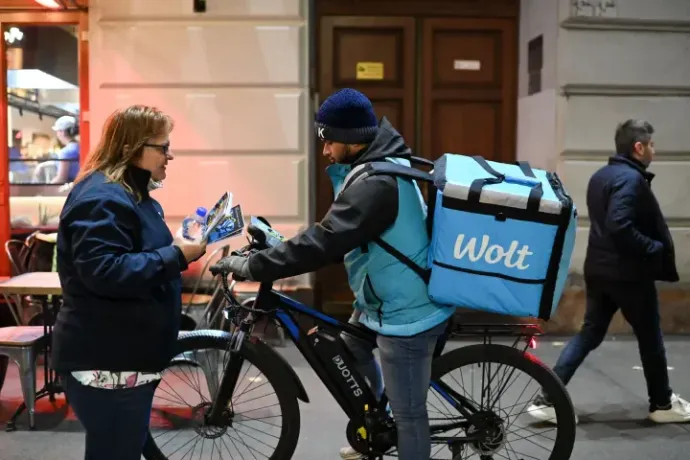
János also noticed that the number of Vietnamese couriers has decreased significantly in the past six months. They were the ones causing the most problems, and not just because of their driving habits. According to János's experience, most Vietnamese have no language skills and do not even have basic education. Most of them could only communicate using Google Translate, which made it very difficult to keep in touch with customers. There were cases where a Vietnamese courier would arrive at the address and then sit in front of it in the street for an hour because he was unable to signal that he had arrived.
Vietnamese couriers are indeed poorly trained, very lost, and don't know English, which makes them even more vulnerable, Juli Halász told our newspaper. She had previously made a video for Telex about the harsh conditions faced by bicycle couriers in Budapest. As she recalled, when making their report, they always had to have an interpreter with them, as this was the only way to talk to the interviewees. According to Juli Halász, most of them have had their two-year visas expire by now, and those who stayed here have mostly been absorbed by battery- and tyre factories. And there are no new ones coming because of the changed visa rules.
The number of Pakistanis, however, has been growing. They have a separate WhatsApp group with 600 members, Gergő Tóth explained. He knows this because – as he is a representative of the bicycle couriers – they invited him to join the group. He uploaded the flyers there as well, and he keeps receiving more and more positive feedback from the couriers about them, proving that the project is a great success. He added that foreign couriers seem to appreciate the fact that someone is looking out for them, as this is not something they have not been used to here. As for the couriers’ grievances and the racism they encounter, Tóth believes that this program is also helping reduce this feeling. Obviously, not everyone in the city is racist, but one idiot among a thousand people can easily ruin a courier's entire day.
For more quick, accurate and impartial news from and about Hungary, subscribe to the Telex English newsletter!